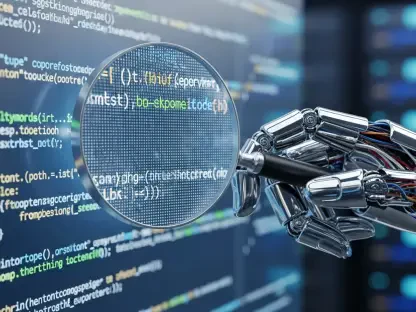A striking revelation from the latest State of Django report captures a transformative shift in the world of web development: a remarkable 69% of Django developers now rely on AI tools like ChatGPT for coding tasks, signaling a profound change in how projects are built and skills are honed. This surge in artificial intelligence integration among developers using Django, the popular Python web framework, underscores a broader movement toward automation and efficiency in the tech industry. The growing reliance on AI tools is not just a passing trend but a pivotal shift reshaping workflows and learning approaches in real-time.
The significance of AI adoption in Django development cannot be overstated in today’s fast-paced tech landscape, where the demand for rapid innovation and streamlined processes drives competition. By leveraging AI, developers are accelerating project timelines, reducing repetitive tasks, and enhancing productivity, which ultimately positions Django as a forward-thinking framework in modern web solutions. This trend reflects a critical intersection of technology and creativity, pushing the boundaries of what developers can achieve.
This analysis delves into the heart of AI integration within Django workflows, exploring detailed statistics on adoption rates, practical applications in real-world projects, expert opinions on its impact, and future implications for the community. The discussion also highlights key takeaways and offers a glimpse into the road ahead for developers navigating this evolving terrain.
Rising AI Integration in Django Workflows
Adoption Statistics and Growth Trends
Data from the comprehensive State of Django report reveals that 38% of Django developers utilize AI as a primary resource for learning the framework, marking a notable shift in educational approaches. Even more striking is the 69% who incorporate AI tools like ChatGPT into their coding tasks, showcasing a deep integration into daily workflows. Other tools gaining traction include GitHub Copilot at 34%, Anthropic Claude at 15%, and JetBrains AI Assistant at 9%, illustrating a diverse ecosystem of AI solutions.
Breaking down specific uses, the report highlights that 56% of developers employ AI for autocomplete features, 51% for code generation, and 44% for crafting boilerplate code, demonstrating its role in tackling mundane yet essential tasks. These percentages indicate a strong preference for AI in enhancing efficiency across various development stages. The reliance on AI for such functions points to a growing trust in its capabilities to deliver accurate and time-saving outputs.
While traditional resources like Djangoproject.com documentation, used by 79%, and Stack Overflow, utilized by 39%, still hold prominence, the report predicts a steady rise in AI adoption in upcoming surveys. This anticipated growth suggests that AI could soon rival or even surpass these conventional platforms as a go-to resource. The shift toward technology-driven tools marks a significant evolution in how Django developers approach both learning and problem-solving.
Real-World Applications of AI in Django Projects
In practical settings, Django developers are harnessing AI to automate repetitive coding tasks, such as generating standard templates or scaffolding project structures, which drastically cuts down on manual effort. This automation proves especially valuable for beginners and seasoned professionals alike, allowing more focus on complex logic rather than routine syntax. The ability to streamline these processes has become a game-changer in maintaining project momentum.
A notable example includes the use of AI to build RESTful API structures with Django REST Framework, a tool adopted by 49% of developers, enabling faster creation of robust endpoints. Additionally, AI aids in optimizing code efficiency by suggesting improvements or identifying redundancies during development cycles. Such applications highlight how AI acts as a virtual assistant, enhancing precision in technical implementations.
Anecdotal evidence from various tech teams points to significant time savings when using tools like GitHub Copilot, with some reporting accelerated delivery of web applications by integrating AI into their sprints. These real-world scenarios underscore the tangible benefits of AI in meeting tight deadlines without compromising quality. Companies adopting these tools often find themselves ahead of the curve in competitive markets, thanks to quicker turnaround times.
Expert Perspectives on AI’s Role in Django Development
Insights from industry leaders and representatives of the Django Software Foundation emphasize AI’s transformative potential in reshaping coding practices and learning methodologies within the community. Many experts view AI as a catalyst for productivity, capable of handling mundane tasks while freeing developers to focus on creative problem-solving. This perspective positions AI as an indispensable ally in modern development environments.
However, challenges accompany this trend, with some experts cautioning against over-reliance on AI-generated code, which could dull critical thinking and core programming skills if not balanced properly. Concerns also arise around the accuracy of AI outputs, as errors or suboptimal suggestions might lead to inefficiencies or bugs if not thoroughly reviewed. These caveats highlight the importance of maintaining a discerning approach when integrating AI into workflows.
Balancing AI adoption with traditional debugging and analytical skills remains a key discussion point among thought leaders, who stress that while AI offers speed, human oversight ensures quality and innovation. The consensus suggests that AI should complement rather than replace foundational expertise in Django development. This balanced viewpoint reinforces the growing significance of AI while advocating for a measured integration into established practices.
Future Implications of AI in Django and Beyond
Looking ahead, AI adoption among Django developers is expected to climb even higher as tools become more advanced and tailored to specific framework needs over the coming years. Predictions indicate that future State of Django surveys could show usage rates surpassing current figures, driven by continuous improvements in AI algorithms. This trajectory points to a deeper embedding of AI within everyday development tasks.
Potential benefits include enhanced productivity, especially for new developers who can onboard faster with AI-guided learning paths, alongside seasoned professionals achieving quicker iterations. However, challenges such as maintaining code quality and ensuring security in AI-generated outputs must be addressed to prevent vulnerabilities. These dual aspects of opportunity and risk will shape how AI influences Django projects in the long term.
Broader implications extend to Django’s synergy with emerging front-end tools like HTMX, used by 24% of developers, and Alpine.js, at 14%, where AI could facilitate smoother integrations through automated compatibility checks or code suggestions. On the positive side, AI may democratize coding skills by lowering entry barriers, yet there’s a risk of fostering dependency that could hinder critical thinking. Navigating these outcomes will be crucial for the community to maximize AI’s potential while mitigating drawbacks.
Key Takeaways and the Road Ahead for Django Developers
The State of Django report paints a vivid picture of a community embracing AI, with 69% of developers using tools like ChatGPT and a strong 80% engagement in modern practices like type hints, alongside PostgreSQL’s dominance at 76% usage. These figures reflect a dynamic balance between cutting-edge adoption and reliance on proven systems. The data underscores a collective push toward efficiency without sacrificing stability.
This blend of innovation and tradition defines the current state of Django development, where newer tools coexist with established solutions like Django REST Framework, favored by nearly half the community. The simultaneous rise in AI usage and sustained preference for robust databases highlight a mature ecosystem ready to adapt while preserving its core strengths. Such equilibrium is essential for sustained growth in a rapidly changing tech environment.
Reflecting on the past, the journey of integrating AI into Django workflows reveals both transformative successes and areas needing cautious navigation. Moving forward, developers are encouraged to embrace AI as a powerful ally, using it to augment rather than replace foundational skills. The road ahead involves striking a strategic balance, ensuring that while leveraging AI for speed and innovation, the community remains rooted in critical expertise and rigorous validation to sustain long-term progress.









